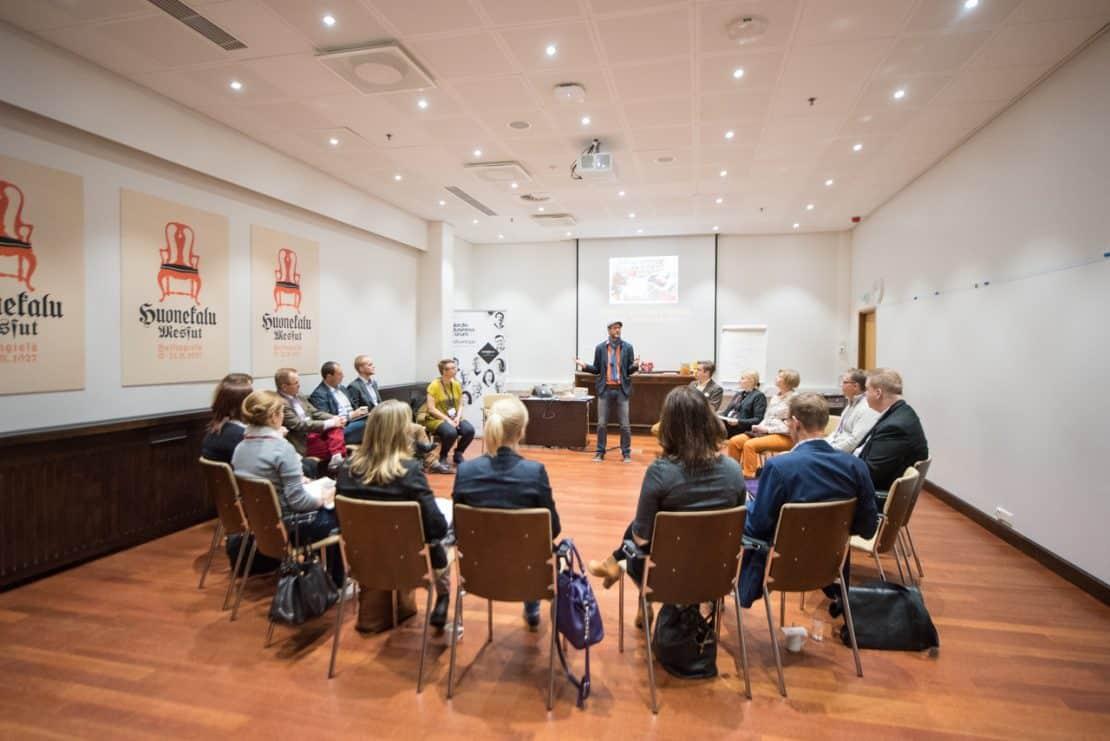7Sep2016
Attending an event like Nordic Business Forum is like attending “a mind spa” as one guest has earlier said. Two days of listening to the speakers and absorbing their knowledge will fill your head with new ideas and insights. But how do you make sure these ideas see the light of day after the event?
One good tip is to take notes and write these ideas down. Every year we remind our customers to take notes and we equip each attendee with notebooks and pens at the event. If you’re not a savvy notetaker, here’s a good video on the topic »
Another very powerful way to reflect and deepen your learning is to share your thoughts with others. That’s what our Post-seminar event is all about. At the Post-seminar, you get the opportunity to discuss and share your experiences with other event guests. According to research, dialogue-type peer learning is one of the most efficient ways to learn. This year there are two options to attend the Post-seminar, either in Helsinki on Oct 8th, or online on Oct 11th or Oct 19th. Check out the topics and groups and register here »
Below is Andrew Scholfield’s thoughts from last year’s Post-seminar and his take on the key components of good peer learning. We recommend reading it through. There are a bunch of great tips for anyone who wants to utilize peer learning setting at their organization.
Event Downloading – Are you backing up your memory?
After a busy seminar schedule with world-class, inspiring speakers, you’ll be forgiven for having a brain so supercharged that you even start discussing with the taxi driver on the way back to the hotel! With so many good ideas in your head, how do you digest and process all these thoughts and concepts? How do you turn what you have heard into a tangible action? How do you apply your learning to the practice of your business?
Positively processing with peers
On the Saturday after Nordic Business Forum 2015 seminar there was the opportunity to reflect on all the themes of the event, with others who had shared the same experience.
The sessions on offer gave a range of different topics to provide a focus for discussion, tackling the big issues, ranging from leadership and strategy to marketing and innovation. In the session I attended, entitled ‘Disruption – Innovate or Die’, our group was led by our personable and engaging hosts, Ollis Leppänen and Jari Junkkari from Intotalo. Asking for a description of the session, in the words of Ollis, “the idea… is to gather learning together in a dialogue, so the groups aren’t lectures!” I was pleased. After two days of listening I was ready to discuss!
To start the session we were asked to introduce ourselves and to provide the group with our personal ‘Mantra’. I thought this is a great idea, not only because it linked to one of the talks, but also because it got us to engage with our own personal values. Sharing an insight like this allows the groups to move past boundaries and helps facilitate interaction, but it also gets us practicing our summation skills to get straight to the point.
The mantras people shared were both fun and thoughtful, from ‘Looking for sexy’ to ‘Being in the moment for others and a better life.’ Whether or not these mantas were any sort of reflection of their personalities didn’t matter. What they gave was a window into what each person’s foremost thoughts were at the time.
The principles of good dialogue
Our dialogue guides wrote on the whiteboard four basic principles to follow in our discussion:
#1 – Use your ears
#2 – Keep your mind open
#3 – Keep the discussion going forward
#4 – Ask open questions
Looking back over these principles I realised how useful they are for general attitudes and communicational behaviour, and not only for isolated discussions. Much of what the speakers had identified as good leadership (asking good questions; giving your full attention to those around you; looking for solutions) could be strongly linked with these principles of good dialogue.
When asked to recap on what ideas from the seminar had logged in our minds, answers included such things as, “getting in over your head,” “ship first, repair later”, “taking time to think” and “organisations being unable to grow above their level of leadership.” These were not all the same and not necessarily what jumped first to my own thoughts. It made me remember that diversity was a key advantage of this type of peer exchange. With members including sales and customer service managers in the IT sector, to psychologists and HR consultants, varying perspectives, and professional motivations are the essence of what you have to gain from these forums.
Great questions lead to great ideas
We were set a group task to pick a successful company and consider what questions they needed to ask of their business model in order to be innovative and develop. This exercise revolved around the need to identify good questions and particularly the right questions. One group discussed Apple and pondered how they chose to progress from computers to portable music players and then to smart phones. Another discussed how Air B’n’B managed to go global from their initial idea, wondering if they asked themselves the question, “How do we help people make money with what they have?”
It was an excellent exercise because whilst we can look at a company’s development and observe the narrative in their story, this is only with the benefit of hindsight. At some point, someone needed to ask that pivotal question. Until this critical point in time a company will be heading in one direction and could quite happily keep going the same way. With a really good question or series of disruptive questions, their course changed and so did the company. It is these challenging questions we should always be searching for, helping to discover new directions and our innovative potential.
Ideas and understanding doesn’t happen in isolation
Critical components of successful innovation strategies include engagement and knowledge sharing. Whether you are an entrepreneur or a professional in an organisation, accessing opportunities for engagement can be difficult, so it is important to take advantage of this type of peer interaction when it presents itself. What these types of discussions allow you to do is to broaden your holistic thinking and question assumptions about your own systems, organisational habits and business models. Sometimes they can even act like a focus group as you might test a hypothesis in a low pressured environment.
Obviously there is no suggestion that these replace real, structured innovation processes. However, particularly for SME’s where resources might be limited, these forums can give varied perspectives to emerging ideas (think communities of practice). On the personal level, they are a great training ground for individuals to learn how to present ideas to people outside of their professional sphere (think of the need to impress clients and shareholders).
Reflection and engaging the double-loop cycle
For those who don’t know already, double loop learning refers to the knowledge you get when you reflect constructively and holistically on the experiences you have gained, and through that learning discover something new. That information may only be small but it allows you to shift your current paradigm.
However, the potential for change this learning can bring about can also be much more profound because it involves emotions. When you understand that ideas are emotional, this is no great surprise and is another reason why this type of low-pressured peer sharing environment can be so crucial to maximising the impact of your new learning. When you and the others in the group can explain and discuss experiences that relate to the new concepts, it opens up many more possibilities to discover emergent knowledge. Done immediately following a seminar, when the information is still raw and unedited, again has the potential to yield greater results.
The reinforcing effect of others
In this type of discussion not only are your seminar peers more likely to recognise the source of the idea, they also share that common need to clarify and develop the concepts you have absorbed. To continue the concept that ideas are emotional, there is a need to have those thoughts and ideas validated by other people, making us feel more secure in our understanding. As has already been discussed, these types of peer dialogues can be highly rewarding as they reinforce the value of concepts as well as your interpretation of them. Because the other individuals in the group have shared the same experiences, they are more likely to recognise how you came to your understanding, and even if they disagree, they can provide more empathy for your thought process and give a quicker and more accurate critique.
Key components of good peer learning
Many companies that attended the seminar also conducted their own similar peer discussions after the event. Whether you are taking advantage of what the NBForum is offering, organising an internal company dialogue, or just engaging informally with a friend, here is a quick summary of key components for your discussion:
- Don’t delay – try to discuss soon after the event as you’ll remember so much more and take advantage of that creative energy
- Be receptive – to what others are saying and the value of different opinions
- Practice summarizing – never underestimate the value of trying to rephrase or shortly explain
- Include different people – diversity is so valuable for developing understanding
- Ask challenging questions – don’t be afraid to ask difficult or different questions – be disruptive!
- Exploit potential in discussions – if you can engage with a concrete idea for your business or structure the discussion it can provide even more tangible outcomes
- Embrace your emotions – not only will this deepen your understanding, but it will help develop creativity and unlock a new dimension for your business
- Constructively empathize – showing understanding for other’s thoughts and ideas will have a profoundly positively effect, lead to a reciprocal benefit and provide more constructive development

 by:
by: 
